Meet Daniele Gatti: an EFG Gramophone Conversation
James Jolly
Monday, January 4, 2016
James Jolly talks to the Royal Concertgebouw Orchestra's Chief Conductor-elect
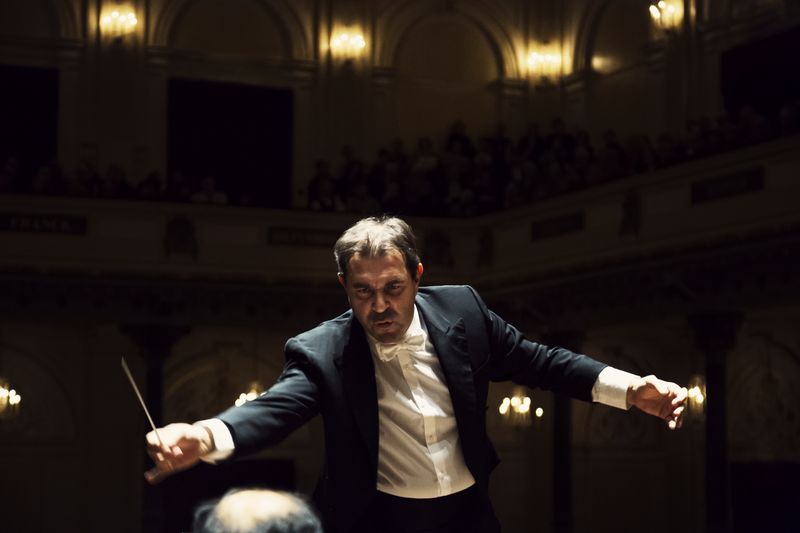
In October 2014, Daniele Gatti was named the seventh Chief Conductor of Amsterdam’s Royal Concertgebouw Orchestra, a post he takes up at the start of the 2016-17 season. Among his previous musical roles are Principal Conductor of the Orchestra dell’Accademia Nazionale di Santa Cecilia (1992-97), Music Director of the Teatro Comunale di Bologna (1997-2007), Principal Conductor of the Royal Philharmonic Orchestra (1996-2009) and Music Director of the Orchestre National de France (2008-). In the opera house he works frequently with the Vienna State Opera, Royal Opera House, Covent Garden, at the Met in New York, at La Scala, Milan and at Bayreuth.
In an exclusive EFG Conversation, James Jolly went to Amsterdam to talk to Maestro Gatti about his career, his relationship with the Royal Concertgebouw Orchestra and how he sees the role of conductor in 2015.
JJ: When did you first conduct the Royal Concertgebouw?
DG: We go back to 2004. Back then I was 42 years old, so I arrived with them with enough wisdom to approach an orchestra like this! And since then I have conducted them every season as a guest. I also had the chance to do some small tours around The Netherlands. In 2013, I was invited to conduct the main, festival tour and we went to Lucerne, Berlin, Grafenegg, Edinburgh and other places.
I have the impression that this came along at the right moment as we’ve covered quite a large repertoire together already. The other important moment in this relationship is when I was invited by them to join in the Mahler Festival. When I began conducting the orchestra I never asked to conduct Mahler because I always came up with programmes that stayed far away from Mahler and Bruckner.
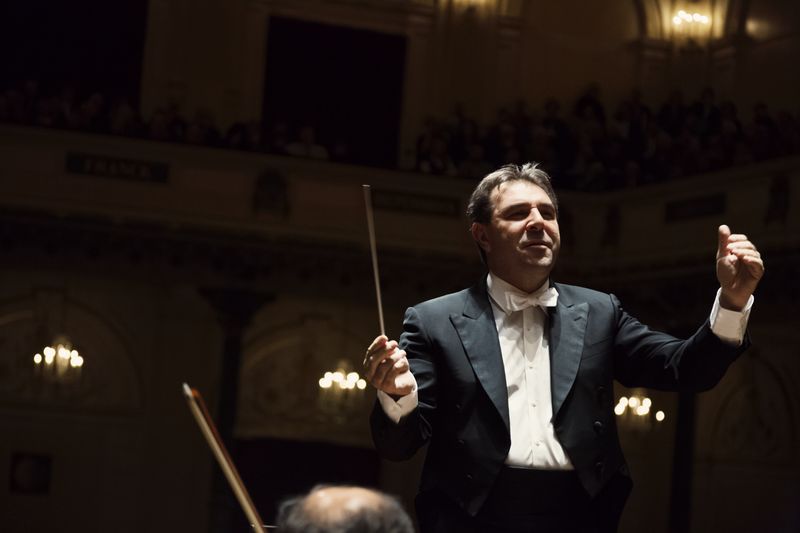
Is that because the Music Directors from Mengelberg on have tended to be Mahler specialists? … Haitink, Chailly, Jansons…
But also because many of my colleagues, when they’re invited to conduct this orchestra, they say we’d like to conduct Mahler – as this is a great Mahler orchestra. I was always very careful not to say ‘I want to do Mahler’. So the prize for me was that they invited me to do Mahler. Coming from the orchestra, it meant a lot. I did Mahler No 5 with them. After that there was also a request to do a Mahler symphony for the European tour. So we did the Ninth and I remember one of the most touching concerts I’ve ever had the opportunity to do was in Lucerne. The playing was amazing and the piece, in my opinion, was completed transformed by the musicians.
When you conduct Mahler with an orchestra like this – that can trace its heritage back through Mengelberg to Mahler himself – what extra does this bring?
That’s not an easy question to answer. There’s a tradition here, but it’s a tradition that can be filtered through different styles of conducting. And that’s prompted me to say that I don't want to change the core repertoire of the orchestra: it needs to stay the same. It’s interesting to observe from a distance that the legacy of the orchestra is made by the music directors leaving their fingerprints on the main repertoire. So we have the Mahler of Mengelberg, the Mahler of Haitink, the Mahler of Chailly and the Mahler of Jansons. And mine in the future! So we try to enrich the history of the orchestra. But of course the Mahler of Jansons is different from the Mahler of Haitink and, inside, the orchestra in the last seven or so years changed 40 percent of musicians. It’s a very young orchestra now.
I’m always fascinated at how an orchestra can maintain a character from generation from generation. Maybe it’s a simple as a young player coming in, sits next to an older one, absorbs the style; the older one leaves and the process is repeated. But there are orchestras, like the Cleveland Orchestra, which is still noticeably the same orchestra that Szell created all those years ago …
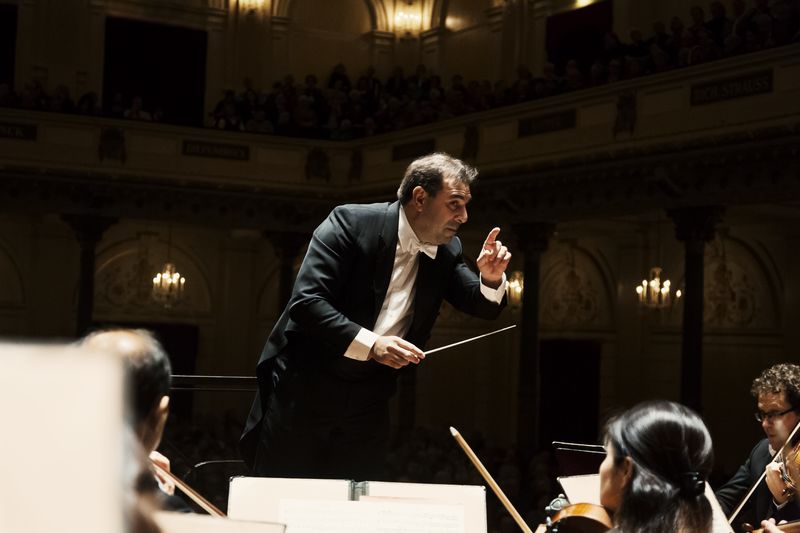
Yes, here – playing in this hall – just brings a particular experience for the players. It’s a fantastic hall but it’s not easy to play in. So I believe there’s a sort of technique needed to play here and newcomers, who have just joined the orchestra, are influenced by that. There’s another thing I’ve noticed here, and this goes back to 2004, right at the start of Mariss Jansons’s time here. Back then I remember an orchestra that was very transparent in its sound, very precise, but then when I conducted this same orchestra seven or eight years later I have the feeling that there was more warmth to the sound, more espressivo, more engaged. And now I have the good fortune to have musicians who respond - before they played in a very elegant way, now they’re a little more on the edge of their seats! So in this case, it’s perhaps a little bit too early to talk about how I might engage with that tradition.
But take something like portamento - is there a Concertgebouw style …
… like the Vienna style? No. But remember that the Vienna Philharmonic is an opera orchestra and the portamento that you encounter there is so connected to the voice. So when a singer makes a portamento the orchestra can find exactly that same characteristic in the playing. Here, or with other major international orchestras, the portamento is still a little more mechanical rather than instinctive.
And is that something you’d like to alter.
Of course! When we did Mahler together I talked a bit about portamento and I tried to explain how close it is a vocal style and there is a moment when it has to start - you don’t know when - but if I sing there is a moment when I have to pass to the higher note and the portamento starts. It’s not something you can define mathematically.
I’ve spoken to some musicians about the acoustic of the Concertgebouw and they’ve said that for their first rehearsal they’ve been completely thrown by it …
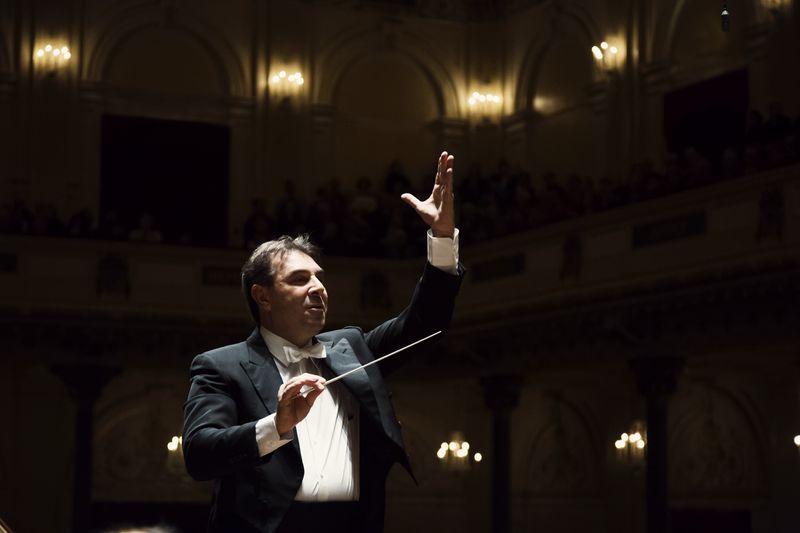
It does take time to get used to. I’m learning, little by little. For instance in this hall we have to be very careful to balance the winds, as well as the brass. From the podium, for the winds, it seems that everything is fine but in the hall they are eating the strings. It depends whether they are sitting on the second level. Sometimes when I’ve sat them lower, closer to the strings, things have changed. Then in an empty hall, for rehearsals, they have to play as short as possible because of the resonance covers the next chord, creating a cluster – as happened this morning in the Stravinsky [Firebird]. But when the audience is there, it’s magnificent.
Does the orchestra have its own seating-plan that it prefers?
Usually when I work with an orchestra I use the seating plan they normally adopt. But now, starting this new adventure, I have some ideas I’d like to try, like bringing the cellos inside the orchestra so [from the audience’s point of view] it would be firsts, seconds, cellos and violas. It’s not particularly unusual - Berlin plays like this and some American orchestras too. Just to see how the sound works with the body of the instrument towards the audience. But usually I’m not someone who arrives and likes to change things because it’s a bit like coming to your house and moving the furniture around! Also I trust the fact that the orchestra has already explored such things and is playing to best effect. They know the position and for them it is more comfortable.
When you take the orchestra on tour to Lucerne or Salzburg or wherever, and they’re performing in a very different acoustic, do they have to adapt?
Yes, and it’s the same with the Vienna Philharmonic because all the time they’re spoiled because they work in such great halls and are there are very few other halls on the same level. We use, very carefully, the hour we have to test the new acoustic - that is a very important rehearsal. But it’s also dangerous because we know the internal balance of the orchestra and if we change too much during that rehearsal it could be a disaster. I also trust the audience - and often the audience knows the hall better than us, so we have to just play so the audience can be comfortable. If, for example, we have to play in a church - which sometimes happens if the town doesn’t have a suitable hall - then I prefer to consider with the musicians what kind of repertoire we should choose.
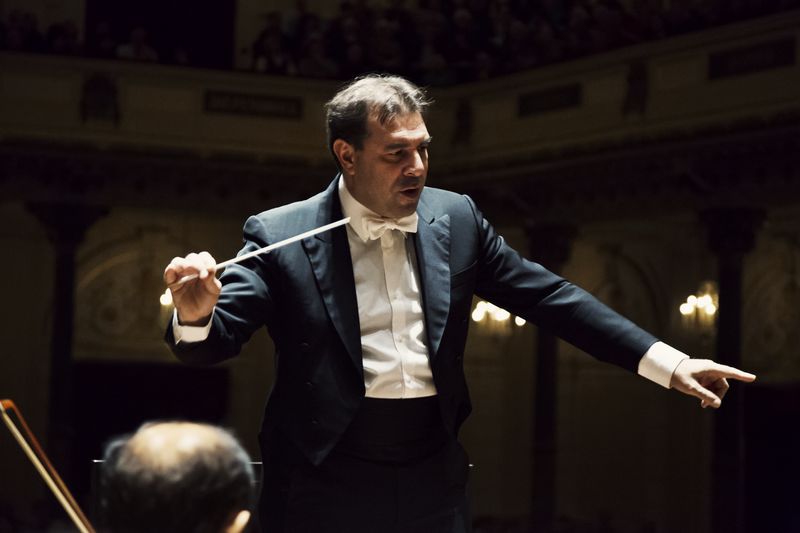
So no Stravinsky!
It’s happened to me!
But Bruckner is fine …
Yes, but sometimes the place is too small for the music and it can’t breathe. The great advantage of the Concertgebouw is that you can play Mahler’s Eighth and a Haydn symphony. And you will have an intimacy during the performance of classical repertoire. This is really unbelievable. I’m also very happy to have an orchestra with whom I can work from the first rehearsal in the same place as the concert. This was not what I had when I was in London - you might rehearse in Henry Wood Hall and play in the Festival Hall. This is the London experience! But it’s a very good discipline to learn. You have to be flexible.
Have you ever conducted another orchestra in this hall?
Yes. I came once with the Orchestre National de France and I came once with the Gustav Mahler Jugendorchester. I did Mahler Seventh here with them.
And opera with the orchestra?
Last year we did our first opera together - we did Falstaff together at the Netherlands Opera in a production I created with Robert Carsen at Covent Garden in 2011 and it was taken on by the theatre here. It was a magnificent experience to Verdi do with them. Fantastic! We’re certainly going to do more opera together - it’s decided. It’s very important that an orchestra has experience in the pit. Sometimes there’s a sort of cliché about Italian music but when done with an orchestra like this you really understand the high class and true mastery in the music.
And Falstaff is such a sophisticated work - both technically as well as musically …
It is an amazing piece. There was nothing like it before and it just exists as a unique creation. I also did it in Paris with my orchestra there and it presents a side of Verdi that’s completely unlike anything else. It’s an opera that brings a lot of satisfaction to the musicians - possibly more than for the audience. My fight often when I conduct Verdi abroad is just to consider and to show that there’s a nobility here and not to be pedestrian - in terms on tempi, accentuation and so on.
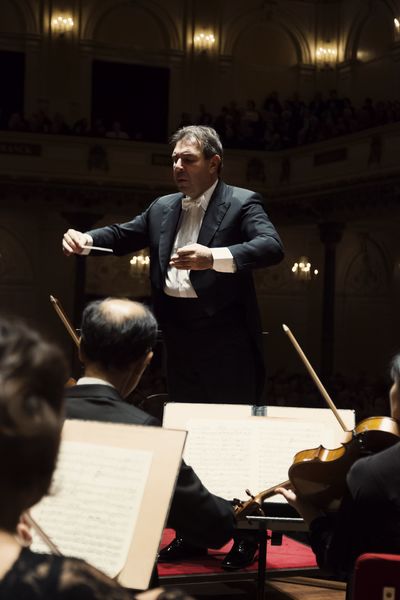
So how will you organise your new life here?
I come from a great experience because for the first time since 2008 I have had my summer free. With Bayreuth, and then with Salzburg, the summer was always busy. This year I had three and a half weeks when I went to the mountains and in all I had almost six weeks free and my future plan will be to focus on the Concertgebouw Orchestra, reducing guesting a lot. I plan to work with just a few orchestras, not more. Just a little bit of opera when the cast and director make it something special. So if I can work from 28 to 30 weeks a year it will be enough.
I also enjoy the prospect of having time to study, to read, to return to certain pieces of music. I need now to start a new period of my life where I can balance work and study – to reconsider the mission of being a musician. For me, that’s almost a religious experience, finding the meaning of my being in this world as a musician. I hate to use the word ‘career’ or ‘profession’ - yes, it is, but for me, it’s more a mission and now after 35 years of conducting its time to make a ‘noble step’ in the relationship with the music, the audiences and the musicians who are playing with me.
I’m always fascinated by the progress of a conductor’s professional life. We mortals think it’s time for a change and do something about it. But it’s not like conductors actually apply for a job … It just happens and I’m always amazed at how often that seems to occur at just the right time. Everyone’s on the move at the moment …
There’s a risk of living off the past, on what you’ve done before – that’s always there. With all the certitude you have when you are confronted with a score, I want to ask questions, put it into discussion. And also because I’m always changing as a man. And for this reason I want to slow down and to try to see the music through the eyes of our own time and as a constantly changing human being. I’m doing that every single day. The technique of rehearsal; how to approach the score and bring a new perspective; taking a lot of risks …
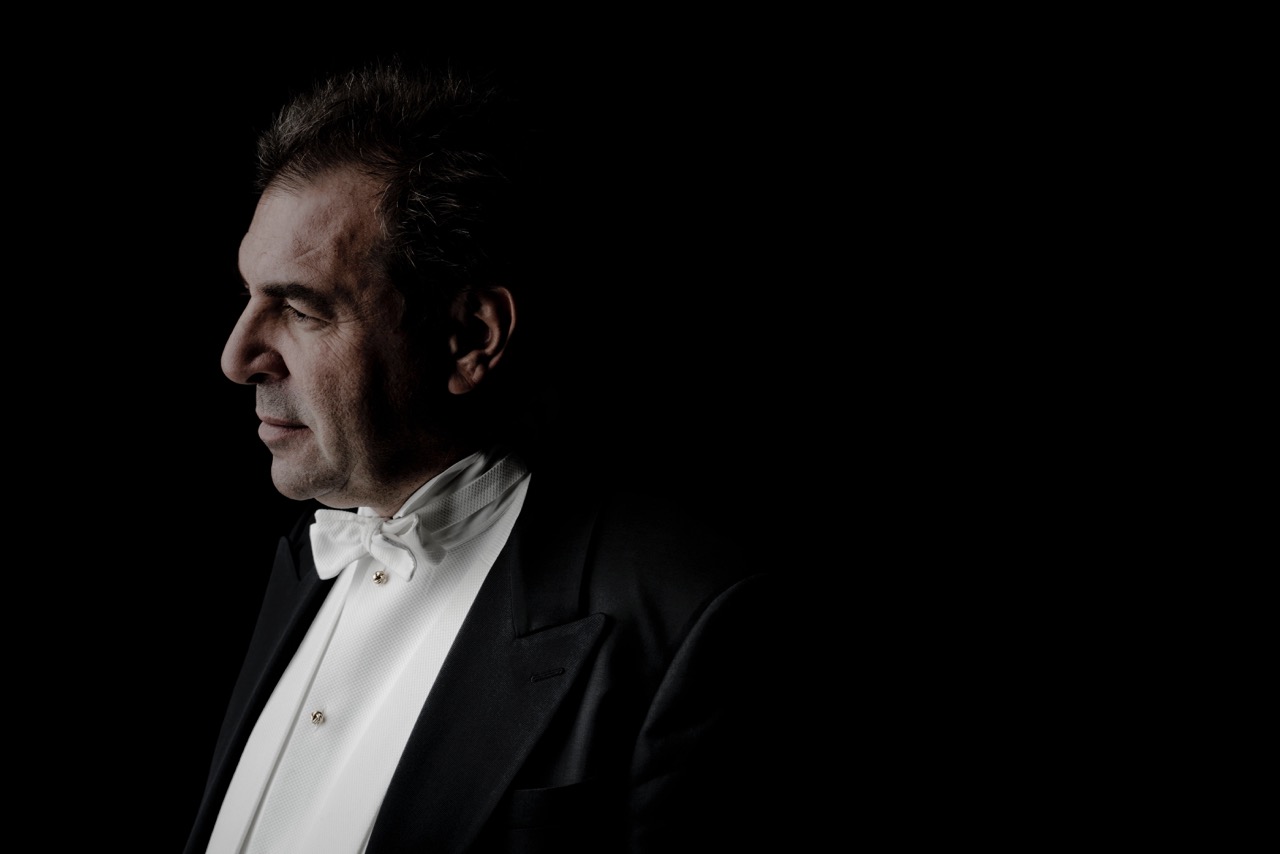
But I also need to be deeply convinced by what I’m doing – and working with the orchestra at it. I can say of a piece of music that yes, more or less, I have a particular style as conductor. I do not want to shock by changing but I want to take the audience with me - it’s important that they follow me in this. It could well be stressful. I’m not a comfortable musician: I know I divide opinion! Some people hate me, others get me! This is something that I consider something very good for the environment because if you create a subject for discussion, audiences can more on. It’s a personal satisfaction that every score that arrives on my desk must be treated as if the composer gave it to me personally a month before. I reopen the score and sometimes I even buy a new score because I don’t want to see my marks and start again, but I know that everything has changed. But I need to reinforce that.
How do you choose repertoire. Do you hear something? Or do you say that’s a work I’ve always wanted to do?
I think I’m naturally connected to the German-Austrian repertoire from the First Viennese School, passing through Wagner and Mahler and then to the Second Viennese School. Then there are times when I’m completely dominated by a particular historical movement. I’m really mad on reading history! When I was in Paris I really studied the French Revolution and its consequences, and what it has brought to our own time. Also to the end of the Enlightenment and what its impact was on art, and philosophy and on music. The end of Sturm und Drang and the beginning of Romanticism and so on. The experience in Paris opened the gates to French Impressionism and to French music in general. When I arrived I said ‘Never in my life Berlioz!’ because I couldn’t simply understand it. Next week, I start work on the Symphonie fantastique for the first time! Last year I conducted Roméo et Juliette - I forced myself! I said I had to! But once I started Berlioz came naturally! And the reverse side of that was the risk that I would delay too long and come to Berlioz too late. I studied the score and discovered its geniality and also now in the Fantastique it’s a field where I can find my fantasy perfectly. Three years ago if you’d talked to me about Berlioz I’d have said ‘No!’. I noted the modernity - and all the work I’d done on other scores came into play. To read the score of the Fantastique, you realise it’s written in the ‘Mahler style’. He’s already putting instruments at fortissimo against others that are pianissimo. And his use of sforzato-piano … Likewise, with Debussy and Ravel which I’d conducted very seldom before but the French orchestra helped me to go inside and now it’s a repertoire I would like to bring here.
And of course, there are those magnificent recording of French repertoire under Haitink.
True, though the French repertoire in recent years has been a little ignored here - also the Second Viennese School which the orchestra is not so familiar with: Berg above all, also Schoenberg and some Webern. It’s so connected to Mahler and I think it would be interesting for them to see beyond the Mahler experience and what he brought.
Do you have a ‘pet’ composer who is not part of the mainstream you’d like to champion? There are certain conductors who have their favourites like Muti and Cherubini, or at one time, Chailly and Zemlinsky.
I like very much Hindemith. When I can, I try to propose his music. I’ve done his major compositions - Konzertmusik, Mathis der Maler, Nobilissima vision but there are others things like the Philharmonisches Konzert … Sometimes it’s too cold but I come from the South and can bring a little warmth. I conducted the complete Mathis der Maler in Zurich and it’s a favourite score of mine. There are other composers I’m going to wait a little bit - the Northern composers!
Generally, Italian conductors steer clear of this repertoire, it seems …
Sibelius Seventh - great piece. Nielsen symphonies, particularly the early ones, too. When I was in Paris there were plans to do the complete Honegger symphonies but it’s a difficult sell and we only did No 3. Then I discovered Bach! He was on my desk when I was a student. As a composition student I wrote a lot of four-voice fugues in the Bach style and then I abandoned it. Then last year I prepared - though for strike reasons it never happened - the John Passion in Paris. But here, I’m prudent! I respect the period instrument tradition and approach but on the other hand we have to be careful not to keep this music in one garden …
But surely we’ve passed through that phase with conductors like Rattle and Chailly doing Bach with modern orchestras - and to great effect. People are comfortable listening to it. And of course the Concertgebouw has a great Bach tradition of its own.
Sure, and they’ve worked with Nikolaus Harnoncourt, with Pinnock, with Koopman and other ‘specialists’. And too would like to do Bach one day here!
Maybe you could sneak a little cantata in one evening!
Or a suite!
Daniele Gatti's next concerts with the Royal Concertgebouw Orchestra are on March 31, April 1 and 3: Wagner's Tannhäuser Overture, Liszt's Orpheus and Berlioz's Symphonie fantastique.











